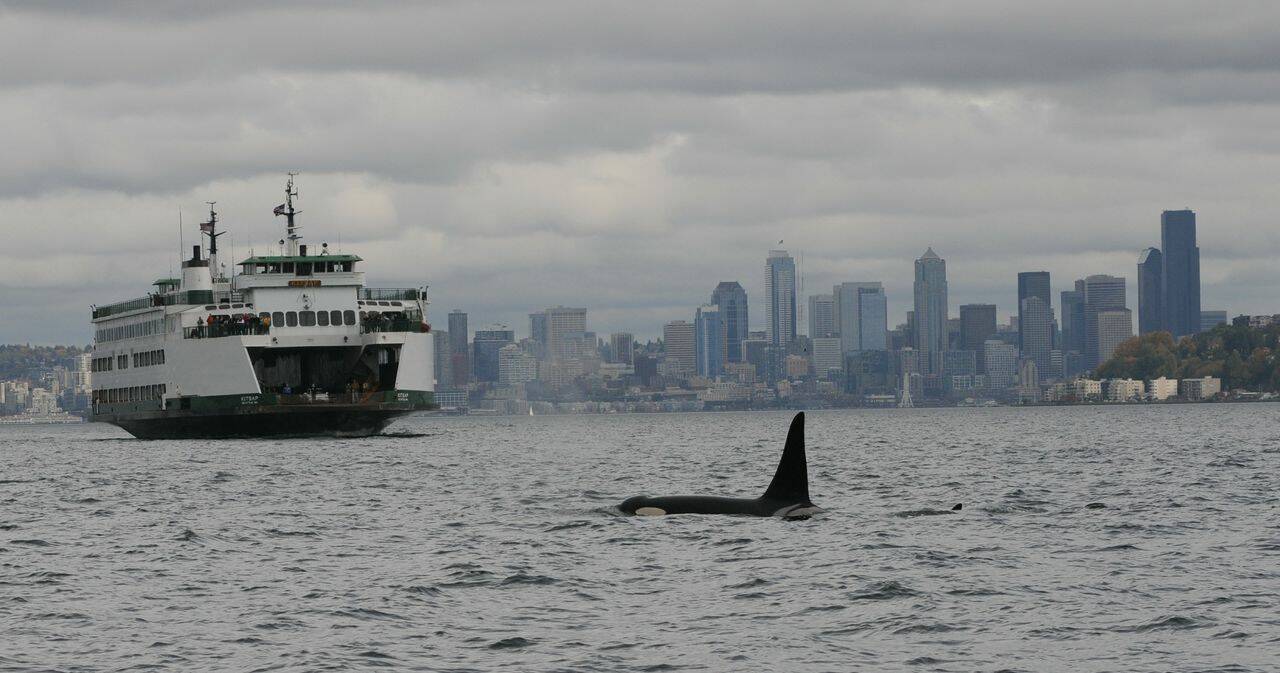Large ships in the Puget Sound are voluntarily slowing down to lessen the negative impact underwater sound can have on endangered killer whales.
The slowdown trial, taking place from Oct. 24 to Dec. 22, is led by Quiet Sound, a part of Maritime Blue, an organization that is dedicated to making the maritime industry more sustainable and equitable.
The slowdown is an attempt to better the lives of southern resident killer whales, a distinct population of orcas that spend several months of the year in Puget Sound. These whales are a critically endangered species. There are currently only 73 of them; it is estimated that a stable population would be about 150 to 200 whales.
“This is the time of year when the whales tend to come south of Admiralty Inlet into Puget Sound, so we’re asking vessels in the shipping lanes to slow down between Admiralty Inlet and Edmonds,” said Rachel Aronson, program director for Quiet Sound. “It’s about 20 nautical miles of what we’re hoping is improved foraging habitat for them.”
Those piloting the vessels are asked to slow down by 30 to 50% which has proven to reduce underwater noise by about 50%, a significant amount.
Aronson explained that the southern residents eat fish like Chinook salmon, also an endangered species. Another reason their numbers are so low is that in the 1960s and 1970s, orcas were being captured and taken to aquariums. The population was never able to fully recover.
Quiet Sound was created as part of Gov. Jay Inslee’s orca recovery task force, a response to the declining number of orcas. The task force consisted of scientists who knew the most about the southern residents and they identified three major threat categories: prey availability (the number of fish in the water), toxins in the water and vessel noise, vessel strike (collision between a boat and marine animal) and simply the presence of vessels close to whales.
“There’s a decent amount of science showing that when vessels are just too close to a whale, they stop hunting and they get kind of uncomfortable having their habitat infringed on,” Aronson said.
Vessel noise affects orcas because they use echolocation to find the fish they eat. The noise from boat propellers is in the same frequency orcas use to hunt and communicate.
“When a vessel slows down, it actually reduces the underwater noise of the vessel by quite a lot and it lessens the impact of the vessel by quite a lot,” Aronson said.
She said even recreational vessels can have a negative impact but Quiet Sounds is focusing on commercial vessels. This includes ferries, cargo and carrier ships, vehicle carriers, bulkers, tankers and tug boats.
“Basically, if it’s a big commercial vessel, we are trying to help them be safer around whales,” Aronson said.
Quiet Sound was modeled after the Canadian ECHO program, which has been doing slowdowns for six to eight years for whales off the coast of British Columbia.
Aronson said it is difficult for humans to hear the underwater noise. For that reason, Quiet Sound is putting a microphone underwater to capture both before and after the slowdown to see if it makes a difference.
She said the response to the initiative so far has been positive.
“We worked with the shipping industry from the very beginning to design the slowdown so that it was something that is feasible, accurate to the realities of what it’s like to be steering these very, very large ships that take 5 miles to slow down,” she said.
A couple shippers have already committed to participating, including Maersk, the second biggest shipping company in the world, as well as Mitsui O.S.K. Lines and Nissan Motor Car Carrier.
Puget Sound pilots, which are at the helm of every large vessel that travels through the inlet, are participating.
“We’ll have an advocate on board every vessel,” Aronson said.
It would be up to the state legislature to decide if the slowdown will become mandatory in the future
“One of the nice things about the voluntary approach is that we can move faster than the regulatory process,” she said.
Pilots have access to the WhaleReport Alert System, an app for commercial pilots that alerts them when a whale has been spotted within 10 nautical miles. Aronson said if members of the public want to support this effort, they can report any whale sighting through this app and another called Whale Alert. This provides real-time information about where whales are.
Quiet Sound will be hosting a press event on Dec. 9 to review the effects of the trial and share next steps. Inslee will be in attendance.


